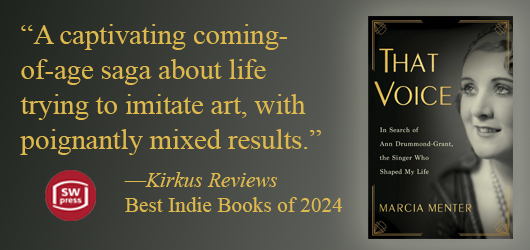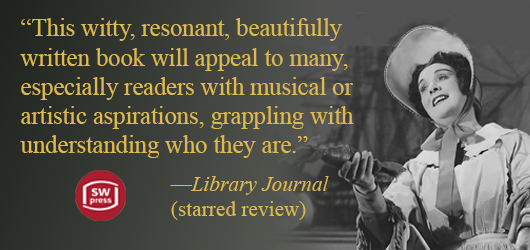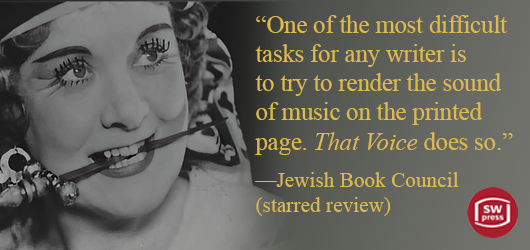Chasing a Ghost and a Dream: Q&A with Marcia Menter, Author of That Voice
Kristine Morris Interviews Marcia Menter, Author of That Voice: In Search of Ann Drummond-Grant, the Singer Who Shaped My Life
We’re always fascinated by the inventive ways a writer chooses to tell their life story—knowing that the most compelling autobiographies offer more than a rote sketch of personal deeds and doings.
Recently, we were thrilled to discover Marcia Menter’s That Voice, in which she entwines her own story with that of a singer she never met, the Scottish contralto Ann Drummond-Grant. Grant’s recordings set Marcia on the path to becoming a singer, a career for which she lacked both the talent and the temperament. But her story is uplifting nonetheless: a sparkling memoir of trying to do what you can’t really do and discovering your true self in the process.
Foreword‘s Kristine Morris calls the book a “remarkable story of passion and perseverance” as it details Marcia’s obsession with Drummond-Grant’s singular talent, quest for privacy, and end-of-life battle with cancer.
As a takeaway from her own life journey, in her conversation with Kristine, Marcia observes: “You learn just as much from your failures as from your successes, and one of the big things you learn is that there’s no such thing as “getting there.” Being there—being who you are in the present moment—is the actual goal.”
Truly, this is a woman with wisdom to share. Enjoy the interview.
Your book is a remarkable story of passion and perseverance, tracing your growth from a small child who felt unheard and unloved to an adolescent who found comfort and belonging in the recorded voice of Ann Drummond-Grant, a singer with Britain’s D’Oyly Carte Opera Company. Her voice spoke to you of inner worlds expressed through song and lodged itself in your psyche. Though you never met her in person, she served as a friend and mentor whose example shaped the course of your life. Learning that the woman you so admired had died in 1959, when you were just six years old, is described in your book as the “largest thing” that had ever happened to you. Though you kept your obsession with her life and work private, you wrote of needing to speak about her now. What has changed that allowed you to reveal the place she held in your life?
I was over sixty when I began writing That Voice. I’d been researching Ann Drummond-Grant obsessively for decades but never spoke about her. I could barely bring myself to say her name. The sound of her voice brought me to a place where I recognized myself—a place where I knew who I was. Voices can have that effect. You can hear something in a singer’s voice (or a composer’s voice, or a writer’s voice) that feels like home. I tended that feeling carefully. If you talk about a sacred thing too much, it can lose its magic. But as I learned more about this woman, I began to feel that she deserved a biography, and that I was the person to write it. She’d been a sustaining presence in my life, and I owed it to her.
As principal contralto of the D’Oyly Carte Opera Company, the legendary Gilbert and Sullivan troupe, Ann Drummond-Grant was beloved on both sides of the Atlantic. Onstage, she had enormous presence. A colleague wrote that when she made an entrance, “no one was left in any doubt that somebody important had arrived.” But offstage, I learned, she was gentle and unassuming, a nurturer. She was always called “Drummie,” a cozy sort of nickname. Her death at age fifty four came as a shock to her fans, who had no idea that she’d been maintaining her rigorous standards as a performer while enduring grueling cancer treatments.
Despite her high public profile, Drummie really was a private person. I found that the only way I could respect that privacy and still do justice to her life was to tell her story in terms of the effect she had on me. Every page of my book reflects this.
You wrote that it was because of Ann Drummond-Grant that you came to believe in the possibility that one could be whole and complete, with a private inner life that no one else had access to, a “non-physical room of [one’s] own.” What else did your profound soul-connection with her add to your life, and what might it have looked like without her influence?
Drummie was a generous performer who gave everything she had. She was also generous with her knowledge of stagecraft, coaching younger colleagues in their roles and watching them from the wings. But there was a sense in which she kept her distance; it was possible to share a dressing room with her and still not know her well. This fascinated me.
She always seemed to me like a woman who had lost something, and my research revealed that she had. Drummie grew up in a working-class family in Edinburgh, Scotland. When she was fourteen and dreaming of a stage career, her mother died of the Spanish Flu, leaving her and her sister to care for their father. She remained in that household fifteen years, until her father’s death freed her to join the D’Oyly Carte. She soon began singing principal roles. But when she fell in love with the company’s musical director, a married man, she was dismissed. (In the 1930s, such things were deemed scandalous.) The two eventually married, but it was ten years before she was able to rejoin the company and tour with her husband—and the D’Oyly Carte was on the road forty-eight weeks a year.
Before I knew about any of this, I was aware of her strength and steadfastness. That’s an old-fashioned word, but steadfast is what she was: dependable, devoted, unfaltering. I could feel that unfaltering presence as I stumbled along my own path. Listening to her recordings, though, I had no illusions about my own singing. I could hear how good she was—and how good I wasn’t. She held me to a higher standard. I have to be grateful for that.
Your decision to pursue a career as a singer and join the D’Oyly Carte Opera Company met with obstacles that included difficulty in finding a teacher who had the skill to help you polish and refine your voice. Why was it so hard to find the right teacher? Now, with the benefit of your experience, what might you suggest to a student who is discouraged at not seeing sufficient progress?
It’s always hard to find the right teacher. Singing is a physical art and a personal art. You need someone who not only understands the mechanics of vocal technique, but who can see the ways you may be undermining yourself. When I started studying at sixteen, I couldn’t be made to understand how the abdominal muscles propel the breath and carry the sound, a physical knowledge that’s critical for good singing. I was so self-conscious about my body that I moved in a cloud of panic; I couldn’t take in what my teacher was trying to show me. In reality, she wasn’t that great a teacher, but I figured she knew what she was doing and that my deficiencies were my own fault.
With the right teacher, things that were difficult become less difficult. You come to understand the workings of your body and breath, and how to produce a sound that’s free and unforced. You learn about your bodily instrument—what it can do and what it can’t. Developing a vocal technique takes time, and progress is (usually) not immediate. If you’re becoming more conscious, more confident, and more skillful, you’re on the right track. If you’re experiencing tiredness and vocal strain and something like despair, you’re not.
What would you say are the most important characteristics a student should seek in a teacher?
There has to be mutual respect. Your teacher should respect you and your instrument, and you should respect your teacher’s knowledge of singing and ability to impart it. You need to be shooting for the same goals—able to communicate openly, and temperamentally suited to each other. And it really helps if you can laugh together.
Your book gives a behind-the-scenes look at the real-life aspects of a career as a performing musician—the rigors of continual touring, repetitive performances, and constant competition for roles—in contrast with your sensitive, introverted nature. You wrote, “If I’d added up all the moments when I took real pleasure in singing over the years, they wouldn’t have amounted to a lunch break.” In hindsight, what might have helped you realize earlier in life that there was something better suited to you out there?
I have no regrets about the amount of time it took me to realize I wasn’t a performer at heart. Sometimes you fling yourself against the same wall until it wakes you up. When I finally gave up on the idea of a singing career, it was with relief and a readiness to move on.
You learn just as much from your failures as from your successes, and one of the big things you learn is that there’s no such thing as “getting there.” Being there—being who you are in the present moment—is the actual goal.
You mentioned loving singing but hating practicing; being such a perfectionist that, in your mind, “one bad note could kill a performance,” and your discomfort at being looked at. What other “red flags” might have set you on a career path other than singing earlier in life?
I hated practicing singing because I wasn’t improving; I was doing the same wrong things over and over and not being properly corrected. But I loved practicing the piano. I had more natural aptitude for that, and with hours and hours of practice, my playing got better and better. I never intended to make a living at it, so I could just enjoy it.
Mind you, every good singer—every professional musician—is a perfectionist. Working to make something perfect is the only way to make it consistently good. The trick is not to beat yourself up with your own perfectionism.
Discovering that your “true instrument” was the written word, you built a career as a writer and editor. Please tell our readers how that came about, and how your delight in the writings of Dante and the “frenetic wordplay” of Gilbert and Sullivan’s iconic works set the stage for the discovery of your authentic self.
It was right in front of me: Writers gonna write. As a teenager, I scribbled down my thoughts in dime-store spiral notebooks that eventually became a source for That Voice. With Gilbert’s words and Sullivan’s tunes dancing in my head, I wrote lyric poems—poems in rhyme and meter, as opposed to the free verse most American teens wrote. Dante, whom I discovered at age twenty, also wrote formal verse—terza rima stanzas in iambic pentameter. I saw how he was able to contain an entire universe within that strict form. The discipline of form is liberating for a writer. Free verse, at least for me, is much harder to write well.
My first jobs were in public relations. It would take me hours to draft a simple press release, but I learned to make every word count. You learn the craft of writing by writing, and by being skillfully edited. If you’re willing to take an editor’s feedback without being prickly about it, your writing will improve. I got into magazine work by writing fashion and beauty copy, which is short and pithy and has to fit in a specific space. Writing lyric poems gave me that skill.
What messages would you most like for readers to take away from reading your book?
Respect your obsessions. They’re your teachers. They light a path to learning who you are.
Your younger self deserves your compassion and affection. You’re going to make a lot of mistakes in your life—everyone does. They’re all part of your story.
Please share something about your current plans/projects.
I’m seventy-one. That Voice is the book I needed to write, and I’m not sure I have another one in me. Marketing an indie book, or any book, has become burdensome, especially for a social-media-averse introvert like me. But I could surprise myself.
Kristine Morris



